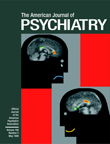Dopamine D4 Gene 7-Repeat Allele and Attention Deficit Hyperactivity Disorder
Abstract
OBJECTIVE: Family, twin, and adoption studies show attention deficit hyperactivity disorder (ADHD) to have a substantial genetic component, and some studies have reported an association between ADHD and the dopamine D4 (DRD4) gene. METHOD: The authors recruited 27 triads that comprised an ADHD adult, his or her spouse, and their ADHD child. These triads were assessed for ADHD, and their DNA was genotyped for DRD4 alleles. RESULTS: A multiallelic transmission disequilibrium test suggested an association between ADHD and the DRD4 7-repeat allele. Among family members, the number of 7-repeat alleles predicted the diagnosis of ADHD. CONCLUSIONS: Prior reports of an association between ADHD and DRD4 generalize to families recruited through clinically referred ADHD adults. However, because there are some conflicting studies, further work is needed to clarify the role of DRD4 in the etiology of the disorder.



